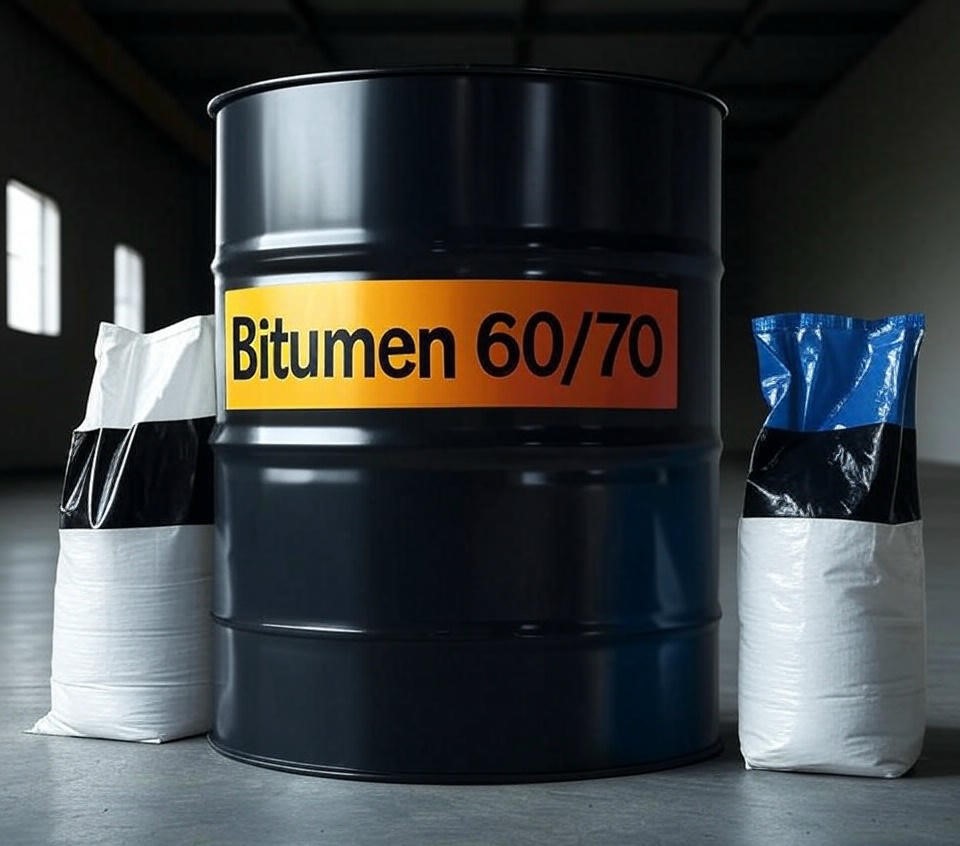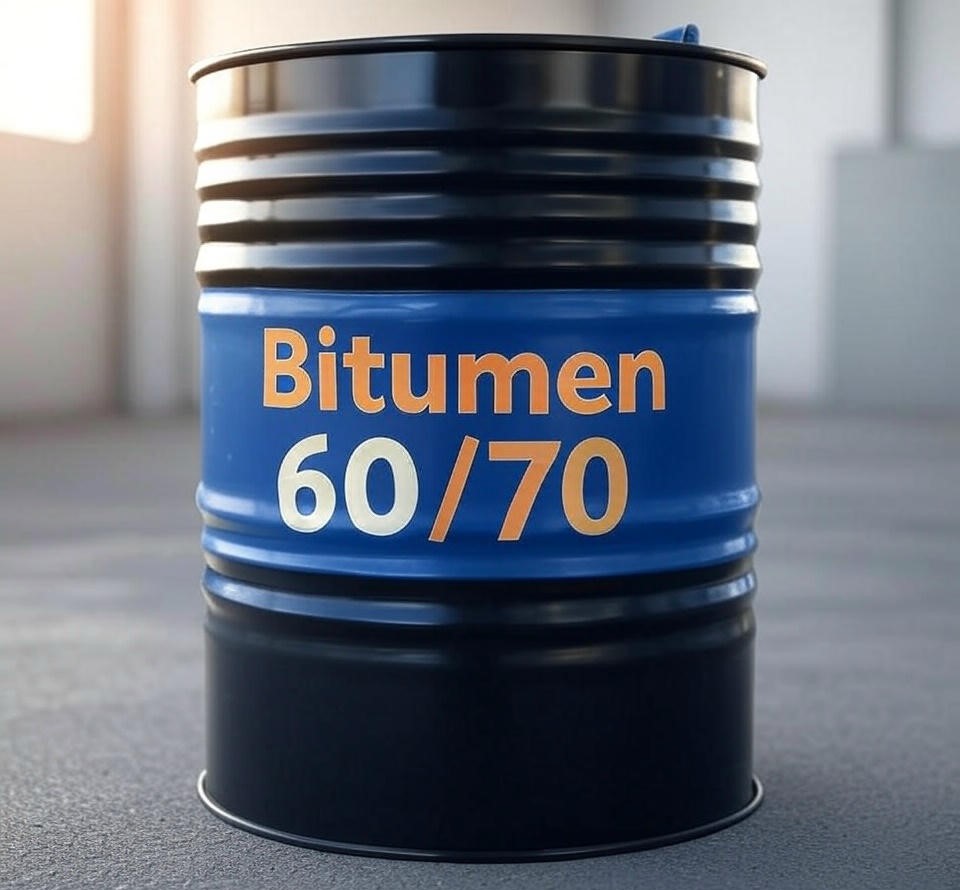Bitumen 60/70 is one of the most commonly used penetration-graded bitumens in the construction industry, particularly for road paving and civil infrastructure. Thanks to its optimal balance of hardness and flexibility, Bitumen 60/70 is favored for its durability and weather resistance, making it suitable for both high-traffic roads and general construction applications. In today’s world, where infrastructure quality directly impacts economic growth and public safety, the role of Bitumen 60/70 cannot be overstated.
What is Bitumen 60/70?
Bitumen 60/70 is one of the most commonly used grades of bitumen, known for its ideal balance of hardness and flexibility, making it perfect for various construction applications. Companies like IRANPETROEXPORT specialize in supplying high-quality Bitumen 60/70 to meet the growing demands of infrastructure projects worldwide.
Definition
Bitumen 60/70 is a semi-solid form of petroleum categorized by its penetration range of 60 to 70 deci-millimeters.
Origin
This type of bitumen is derived from the distillation of crude oil during petroleum refining.
Penetration Grading
The 60/70 number refers to how far a standard needle penetrates the bitumen under controlled conditions.
Texture and Appearance
It is black, sticky, and highly viscous at room temperature but becomes fluid when heated.
Industry Standard
Bitumen 60/70 is widely accepted in international markets for road surfacing due to its quality and consistency.

Importance in Modern Infrastructure
- Road Durability
- Economic Efficiency
- Ease of Application
- Global Availability
- Compliance with Standards
Road Durability
Bitumen 60/70 plays a vital role in modern infrastructure by significantly increasing road lifespan. Thanks to the flexible yet resilient nature of Bitumen 60/70, roads can withstand heavy traffic loads and fluctuating temperatures without rapid wear and tear.
Economic Efficiency
In terms of budget-friendliness, Bitumen 60/70 stands out because it provides long-term durability at a competitive cost. Governments and contractors often choose it for large road networks, minimizing the frequency of repairs and reducing overall maintenance expenses.
Ease of Application
One major advantage of Bitumen 60/70 is how user-friendly it is during application. Whether it's being used in hot-mix asphalt or surface dressing, Bitumen 60/70 melts and mixes well, making the construction process smoother and faster.
Global Availability
Bitumen 60/70 is manufactured in numerous countries and exported globally, ensuring a steady supply for developing infrastructure. The availability of Bitumen 60/70 helps stabilize markets and supports the construction of roads in both developed and developing countries.
Compliance with Standards
Since Bitumen 60/70 is produced under strict refining and testing standards, it aligns with international quality benchmarks. This makes it a safe, reliable, and standardized material for infrastructure projects anywhere in the world.

Manufacturing Process of Bitumen 60/70
The production of Bitumen 60/70 follows a well-structured and controlled process to ensure the final product meets industry standards. From selecting the right crude oil to refining it using precise techniques and implementing rigorous quality control, every step plays a vital role in producing high-quality Bitumen 60/70 that performs reliably in infrastructure projects.
Sourcing Crude Oil
Bitumen 60/70 starts its journey with the careful selection of heavy crude oil, which is rich in long-chain hydrocarbons. This type of crude is preferred because it produces a higher yield of residue suitable for bitumen. The origin and composition of the crude directly influence the performance of Bitumen 60/70, making this sourcing step essential to maintaining consistency.
Refining Techniques
The refining of crude oil to produce Bitumen 60/70 primarily involves a process called vacuum distillation. In this step, lighter components are separated, and the heavy residue is collected and further treated. Through processes such as air blowing or solvent de-asphalting, the viscosity and penetration levels of Bitumen 60/70 are precisely adjusted to match the 60/70 grade requirements.
Quality Control Measures
To guarantee durability and safety, quality control plays a crucial role in every batch of Bitumen 60/70. Laboratories conduct rigorous testing—including penetration, softening point, ductility, and flash point tests—to ensure the material meets specifications. Consistent monitoring at this stage ensures that Bitumen 60/70 is suitable for use in demanding infrastructure conditions.
Applications of Bitumen 60/70
Bitumen 60/70 is a versatile material used across various industries, thanks to its durability, adhesive properties, and resistance to environmental factors. Its primary applications are in sectors that require long-lasting performance under harsh conditions.
Road Construction
Bitumen 60/70 is the preferred binder in asphalt mixtures for road building due to its excellent bonding and flexibility. It helps roads resist deformation and cracks under heavy traffic and temperature changes.
Waterproofing
The water-resistant nature of Bitumen 60/70 makes it ideal for waterproofing foundations, tunnels, and basements. It forms a protective barrier against moisture intrusion, ensuring long-term structural integrity.
Roofing and Insulation
Bitumen 60/70 is widely used in the production of roofing felt and membranes. It provides strong adhesion and thermal insulation, helping buildings maintain energy efficiency while staying protected from the elements.
Environmental Considerations
As sustainability becomes a core focus in construction, the use of Bitumen 60/70 is being reassessed through an environmental lens. Modern production and application methods are evolving to reduce negative impacts on the planet while maintaining performance and durability.
- Eco-friendly practices
- Recycling bitumen
- Reducing carbon footprint
Eco-friendly Practices
Manufacturers and contractors are now adopting eco-friendly practices when producing and applying Bitumen 60/70, such as using cleaner energy sources, minimizing waste, and optimizing production temperatures. These approaches reduce emissions and make the use of Bitumen 60/70 more aligned with environmental goals in infrastructure projects.
Recycling Bitumen
Recycling old pavements that contain Bitumen 60/70 is a cost-effective and sustainable solution. The reclaimed material is processed and reused in new asphalt mixtures, reducing the demand for virgin bitumen and preserving natural resources. This recycling approach extends the lifecycle of Bitumen 60/70 while minimizing environmental impact.
Reducing Carbon Footprint
Efforts to lower the carbon footprint of infrastructure include using warm-mix asphalt technologies with Bitumen 60/70, which requires less energy for application. This not only cuts down on fuel consumption but also leads to fewer greenhouse gas emissions during road construction and maintenance.

Bitumen 60/70 Price Factors
The price of Bitumen 60/70 is influenced by several dynamic elements within global and local markets. Understanding these factors is essential for contractors, suppliers, and decision-makers who need to manage budgets and project timelines effectively.
- Crude oil influence
- Demand and supply
- Seasonal variations
Crude Oil Influence
Since Bitumen 60/70 is a byproduct of crude oil refining, fluctuations in global crude oil prices directly affect its cost. When oil prices rise, the cost of producing Bitumen 60/70 increases, which leads to higher prices in the market. As oil remains a volatile commodity, its impact on bitumen pricing is constant and significant.
Demand and Supply
The balance of supply and demand in different regions also plays a key role in determining the price of Bitumen 60/70. During periods of high construction activity, such as government infrastructure rollouts, demand increases and can drive prices up. On the other hand, oversupply or low project activity can ease pricing pressure on Bitumen 60/70.
Seasonal Variations
Weather and seasonal changes can influence the price of Bitumen 60/70 as well. For example, construction slows down during winter in colder climates, reducing demand and lowering prices temporarily. In contrast, warmer months see peak usage, which can tighten supply and increase costs due to logistical and production constraints.

Bitumen 60/70 in Different Countries
Bitumen 60/70 is globally recognized for its performance in various climatic and infrastructural conditions. However, its usage patterns, demand, and application methods can vary significantly across different countries based on geography, infrastructure priorities, and climate.
- Usage in India
- Usage in the Middle East
Usage in India
India is one of the largest consumers of Bitumen 60/70, primarily due to its extensive road network development and maintenance projects. The Indian government heavily relies on Bitumen 60/70 for national highways, rural roads, and expressways because of its cost-effectiveness and strong performance in India's diverse weather conditions. Additionally, Indian refineries produce large quantities of Bitumen 60/70 to meet domestic needs, reducing reliance on imports.
Usage in the Middle East
In the Middle East, Bitumen 60/70 is widely used in both urban and intercity infrastructure development, particularly in countries like the UAE, Saudi Arabia, and Oman. Despite the region’s extremely hot climate, Bitumen 60/70 remains a suitable choice due to its ability to withstand high temperatures and heavy vehicle loads. Local production and export hubs also make Bitumen 60/70 more accessible, reinforcing its role in regional infrastructure planning.
Conclusion
Bitumen 60/70 remains a crucial material in modern construction, offering excellent durability, flexibility, and performance across a wide range of applications. Its role as a paving bitumen in road construction, along with its use in bitumen waterproofing for buildings, demonstrates its versatility and reliability. As industries focus more on sustainability, the production and use of Bitumen 60/70 are also evolving to incorporate eco-friendly practices and recycling, making it a more responsible choice for future projects. Understanding the factors that influence its price and regional uses helps stakeholders make informed decisions, ensuring infrastructure projects are both cost-effective and long-lasting. Overall, Bitumen 60/70 continues to be a foundation for building resilient and sustainable infrastructure worldwide.
